Doodles and poems found in Black Book of Carmarthen
- Published
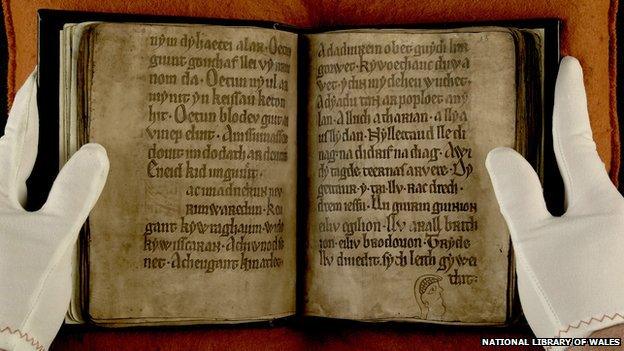
The book is the first Welsh text to include medieval figures such as King Arthur
Ghostly faces and snatches of text have been found hiding in one of Wales' oldest and most important books.
The 750-year-old Black Book of Carmarthen is the first Welsh text to include medieval figures such as King Arthur and Merlin.
But for hundreds of years never-before-seen poetry and pictures have been hidden to the naked eye.
Now, thanks to high resolution photography and UV lighting, some of its secrets have finally been revealed.
The book, which was written in the priory at Carmarthen, is now owned by and kept at the National Library of Wales in environmentally controlled conditions to protect the fragile text.
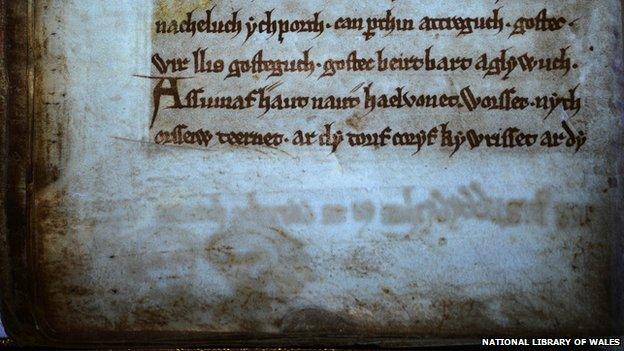
Ghostly faces hidden at the bottom of this page were uncovered by UV lighting
The collection of poetry and illustrations was penned by one scribe in the 13th Century who added to it over the years.
It was then passed from owner to owner, with more additions being made in the margins.
Prof Paul Russell, from the University of Cambridge, who has been uncovering the book's secrets, said: "That tradition of adding to it over the years was carried on by subsequent owners, it was a living text that was constantly added to."
But 300 years after it was first written the then owner, believed to be Jaspar Gryffyth, decided to purge the pages of anything that was not original.
Prof Russell added: "This man in the 16th Century went through the book tidying it up. The owner erased a lot of material from the left, right, top and bottom margins. Anything he thought was an addition, he got rid of."

The Black Book
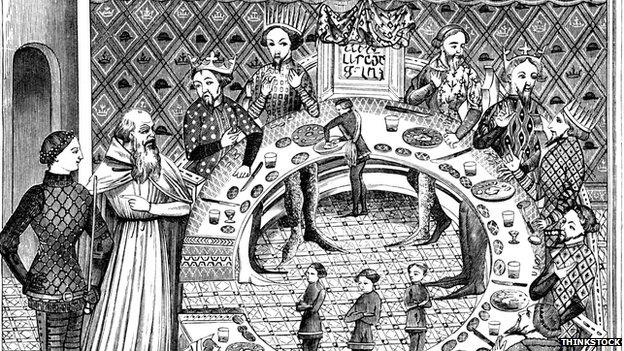
The earliest poem concerning the adventures of King Arthur appears in the book, his wizard Merlin also appears
The book measures just 17cm by 12.5cm and has 54 pages
Although it was written by just one scribe over a number of years his handwriting got increasingly smaller as he got older
It is called the Black Book because of the colour of its binding
It contains pieces of religious verse and story poetry
The book was bought by the founder of the National Library of Wales, Sir John Williams, in 1904

The book was written on vellum - animal skin which has been stretched, dried and smoothed.
Prof Russell believes the person who erased parts of the book used a pumice stone.
He said: "It takes off a slight layer off the surface, but the ink has penetrated a bit further so what we can do is use UV light to bring out that ink.
"On some bits of it you can't recover anything as it has been rubbed so hard."
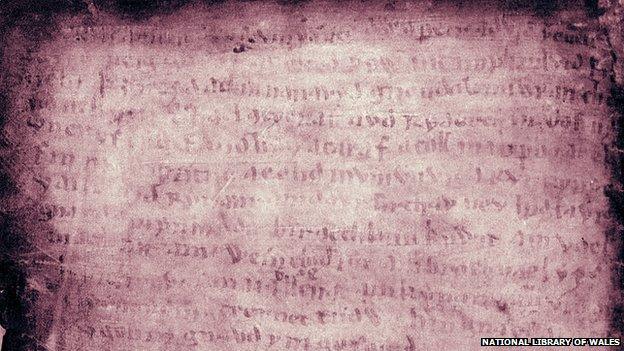
The forgotten Welsh poetry hidden within the Black Book of Carmarthen
Although it was suspected there could be some text hidden within the pages, the researchers who first looked at the book under UV light were shocked when they found two faces staring out at them.
Prof Russell said: "It was a scary moment when we turned the page and out popped these faces in the bottom corner, along with a line of Welsh which goes with them.
"We think the line of Welsh was from one kinsman donating something, possibly the book, to another kinsman."
They went on to discover a page of medieval Welsh poetry, which they believe has never been seen before.
They found a drawing of a fish on another page, and are continuing their search for other hidden text and images in the book.

Uncovering the secrets of ancient books

Special lighting was among the techniques used by researchers to uncover the book's secrets
The Black Book of Carmarthen is not the first to have had hidden secrets uncovered by using modern techniques.
Material to write on in medieval times was expensive and hard to get hold of, so it was not unusual for it to be reused.
With the Black Book the researchers used a number of techniques to try and uncover text hidden within the pages.
They first looked at some of the pages with UV light, before taking high resolution photos which they digitally enhanced.

Prof Russell said: "It goes to show that there is still so much to be learnt from the Black Book of Carmarthen, even though it is a familiar text.
"Modern technology makes these things a lot more accessible to more people.
"What we have discovered may only be the tip of the iceberg in terms of what can be discovered as imaging techniques are enhanced."
Prof Russell and PhD student Myriah Williams will present their discoveries so far to a conference at the National Library of Wales in Aberystwyth on Wednesday.
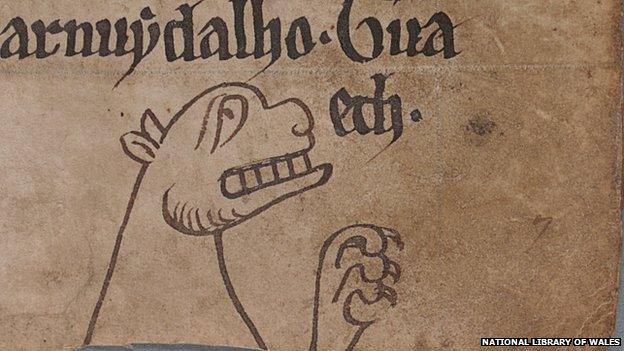
One of the illustrations which wasn't erased from the Black Book of Carmarthen